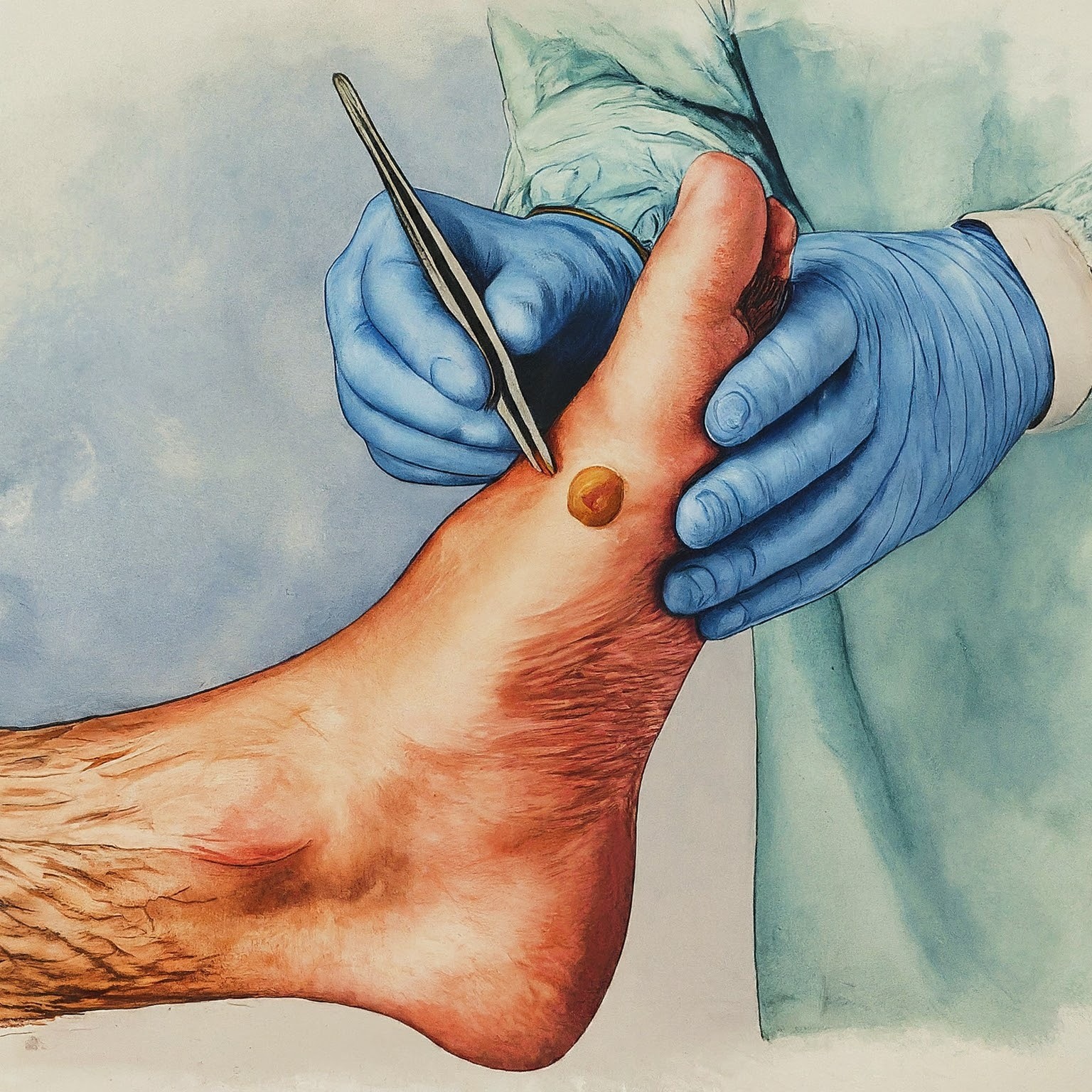Dermatologist or Podiatrist for Plantar Wart
| Specialist | Dermatologist | Podiatrist |
| Expertise | Skin conditions, including warts | Foot and ankle health |
| Treatment Options | Topical medications, cryotherapy, laser therapy, curettage, surgery | Pain management, orthotics, padding, debridement, surgery |
| Focus | Skin health, underlying conditions | Foot mechanics, pain management |
| Best for | Small, painless warts, addressing skin concerns | Painful warts, complex or recurring warts, foot pain management |
Table of Contents
Introduction
Plantar warts, those stubborn growths on your feet, can be painful and unsightly. While they may eventually disappear on their own, seeking professional help can be the quicker and more effective solution. But with two specialists in mind – dermatologists and podiatrists – who should you turn to? Let’s dive into their expertise and help you choose the right foot doctor for your plantar wart woes.
The Case for the Dermatologist:
- Skin Experts: Dermatologists liked Dr. Anju Methil from Skin and Shape specialize in diagnosing and treating all skin conditions, including warts. They have extensive knowledge about different wart types and can accurately diagnose your plantar wart.
- Treatment Variety: They offer a wide range of treatment options, from topical medications and salicylic acid applications to cryotherapy (freezing) and laser therapy. They can also perform procedures like curettage (scraping) or surgical removal for more stubborn warts.
- Addressing Underlying Issues: Dermatologists can identify any underlying conditions contributing to your warts, such as a weakened immune system, and recommend appropriate solutions.
The Case for the Podiatrist:
- Foot Specialists: Podiatrists focus exclusively on the health and well-being of your feet and ankles. They have a deep understanding of the anatomy and biomechanics of the foot, making them adept at treating foot-specific conditions like plantar warts.
- Pain Management: Podiatrists can prescribe pain-relieving medications or orthotics to alleviate discomfort caused by the wart’s pressure on your foot. They also offer techniques like padding and debridement to reduce pain and pressure.
- Surgical Expertise: For complex or recurring warts, podiatrists are trained in various surgical techniques like excision and laser ablation for precise removal.
Choosing the Right Doctor for You:
- Severity of Your Wart: If your wart is small, painless, and not causing significant discomfort, a dermatologist may be a good first choice. They offer a variety of treatment options and can address any underlying skin concerns.
- Pain and Discomfort: If the wart is painful or causing significant discomfort, a podiatrist can offer pain management solutions alongside wart removal. Their expertise in foot mechanics can be beneficial.
- Complexity of the Wart: For large, stubborn, or recurring warts, a podiatrist’s surgical expertise might be more suitable.
- Personal Preference: Ultimately, the choice boils down to your individual preferences and comfort level. Consider your doctor’s experience with plantar warts, location, and insurance coverage.
Remember:
- Early diagnosis and treatment are key: Don’t wait for your wart to worsen or spread. Seek professional help early on for faster and more effective treatment.
- Consult your primary care physician: They can help guide you towards the right specialist based on your specific situation.
- Ask questions and feel comfortable with your chosen doctor: Open communication ensures you receive the best care possible.
By understanding the strengths of both dermatologists and podiatrists, you can confidently choose the right foot doctor to address your plantar wart concerns and get back to pain-free steps!
Plantar Wart FAQs: Dermatologist vs. Podiatrist?
| Question | Answer |
|---|---|
| 1. Which specialist should I see for a plantar wart? | It depends on your individual situation. Consider the wart’s severity, pain level, and complexity. See a dermatologist for small, painless warts or skin concerns. For painful, complex, or recurring warts, a podiatrist might be better. |
| 2. What treatments do dermatologists offer for plantar warts? | Topical medications, cryotherapy (freezing), laser therapy, curettage (scraping), and surgery. |
| 3. What treatments do podiatrists offer for plantar warts? | Pain management (medication, orthotics), padding, debridement, and surgery. |
| 4. Can a dermatologist diagnose a plantar wart? | Yes, they have extensive knowledge of different wart types and can accurately diagnose your case. |
| 5. Can a podiatrist remove a plantar wart? | Yes, they are trained in various surgical techniques like excision and laser ablation for precise removal. |
| 6. Do I need a referral to see a dermatologist or podiatrist? | It depends on your insurance plan. Check with your primary care physician or insurance provider. |
| 7. How long does it take to treat a plantar wart? | Treatment time varies depending on the wart’s size, location, and chosen method. It can range from weeks to months. |
| 8. Are there any home remedies for plantar warts? | While some methods like soaking and salicylic acid may help, professional treatment is generally recommended for effectiveness and safety. |
| 9. Can plantar warts be prevented? | Wearing shoes in public places, keeping feet dry, and avoiding picking at warts can help reduce the risk of infection. |
| 10. Can plantar warts spread? | Yes, they are contagious through direct contact or sharing contaminated items like towels and shoes. |
